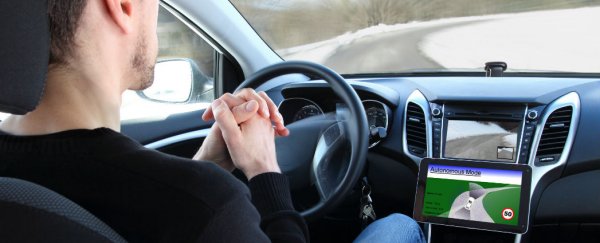Over the weekend, correspondence obtained by The Guardian showed that staff at Apple have been in talks with officials from GoMentum Station, a former naval base near San Francisco that now serves as a high-security testing ground for autonomous vehicles.
The documents, which were obtained under a public records act request, contain the first record of Apple's involvement in the self-driving car market, though it's been rumoured for months that something like this was in the works. Back in May, Apple senior vice-president Jeff Williams called the car "the ultimate mobile device", and added that the company was interested in expanding into whatever market it thought it could make "a huge amount of difference" in. Robot cars appear to fit the bill.
With no official comment from Apple regarding the Guardian exclusive, we can only assume that the company isn't quite ready to reveal its plans, which makes GoMentum Station the perfect place to test them out. With 32 kilometres of test roads - including paved highways, city streets, highway overpasses, and railway crossings - GoMentum Station is reportedly the largest secure test bed site in the US, and is guarded around the clock by military personnel to keep members of the public out.
Mercedez-Benz, Honda, and Acura have all shown interest in testing their autonomous cars there, with Honda being the first to sign a US$250,000 memorandum of understanding with the facility to begin testing. Now it looks like Apple is considering a similar arrangement.
"We are hoping to see a presentation on the … testing grounds with a layout, photos, and a description of how the various areas of the grounds could be used," Apple engineer Frank Fearon wrote to the facility, according to the documents obtained by The Guardian. Further correspondence from Fearon involved questions about the availability of the space and how Apple would coordinate with other companies with regards to the timing and availability of the space.
"We had to sign a non-disclosure agreement with Apple," Randy Iwasaki, executive director of the Contra Costa Transportation Authority, which owns GoMentum Station, told Mark Harris at The Guardian. "We can't tell you anything other than they've come in and they're interested."
Further evidence for the existence of an autonomous car project at Apple - which has been codenamed Project Titan in the obtained documents - is listed by Harris:
"[Apple CEO Tim] Cook has met with Fiat-Chrysler boss Sergio Marchionne and may have toured BMW's i3 electric car assembly line in Germany last year. The company has also been recruiting automotive experts from Silicon Valley and beyond, hiring engineers from Tesla Motors and Mercedes-Benz, as well as power experts from electric car battery maker A123 Systems."
It's all looking pretty promising, but Chris Ziegler at The Verge cautions that The Guardian's assertion that Project Titan "is further along than many suspected" might not be true. In fact, Project Titan is probably about as advanced as we should expect, given what we know about it so far.
Back in February, Bloomberg reported that an Apple self-driving car could be in production by 2020, and considering the pace of development for other manufacturers, planning the testing phase now with a five-year timeframe ahead of them seems pretty reasonable. Tesla is now at the 3.5-year mark, and still nowhere near getting its autonomous cars on the market, and BMW has itself stated that five years is about what it takes to get technology like this off the ground.
"For them, the entire story arc takes five years - from requirements-gathering to production - and that's for an experienced automaker with all the key employees already in place and many decades of understanding on how to actually make a road-going vehicle," says Ziegler. Apple, on the other hand, is starting from scratch.
The other possibility is that Apple doesn't actually intend on building its own self-driving cars, but instead wants to develop its own platforms to be used inside them, as Google has been doing. Ziegler speculates that Apple will begin with this kind of technology, working on sensors and user interfaces to work inside someone else's self-driving car, while a separate team works on the much longer-term goal of building the actual cars.
All we can do is wait and see, and hope against hope that this monstrosity is not what we end up with.
